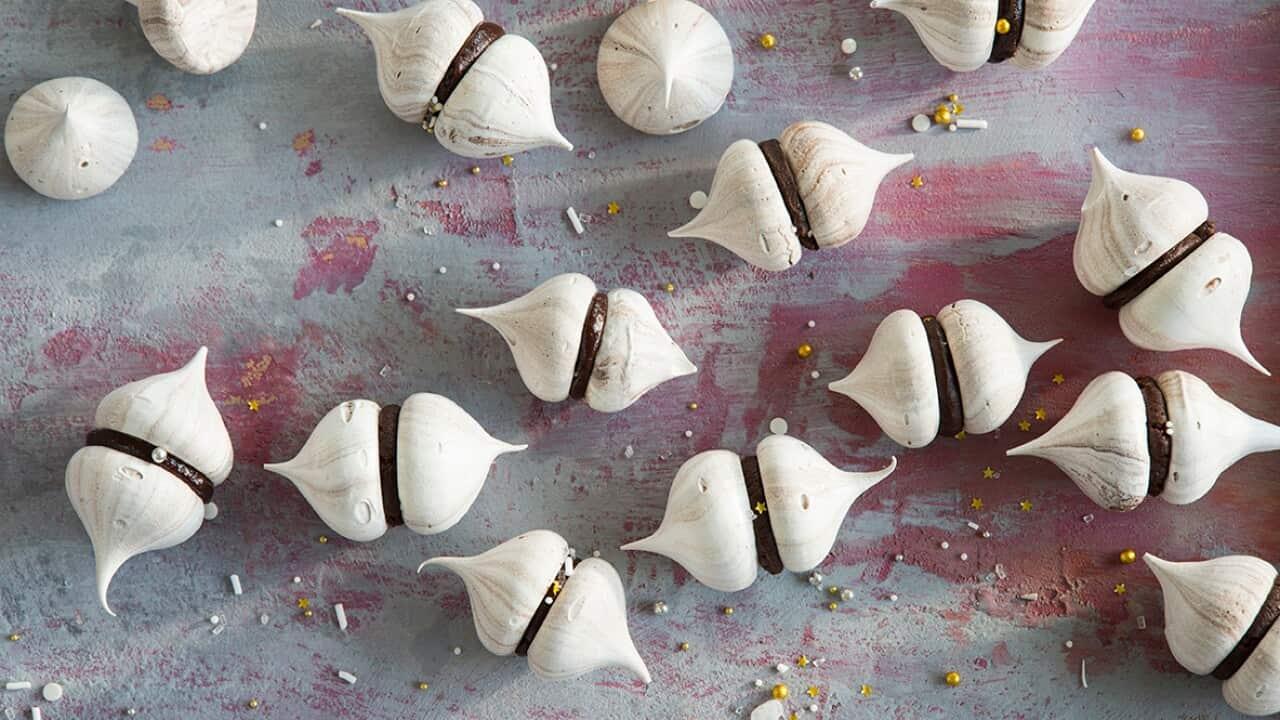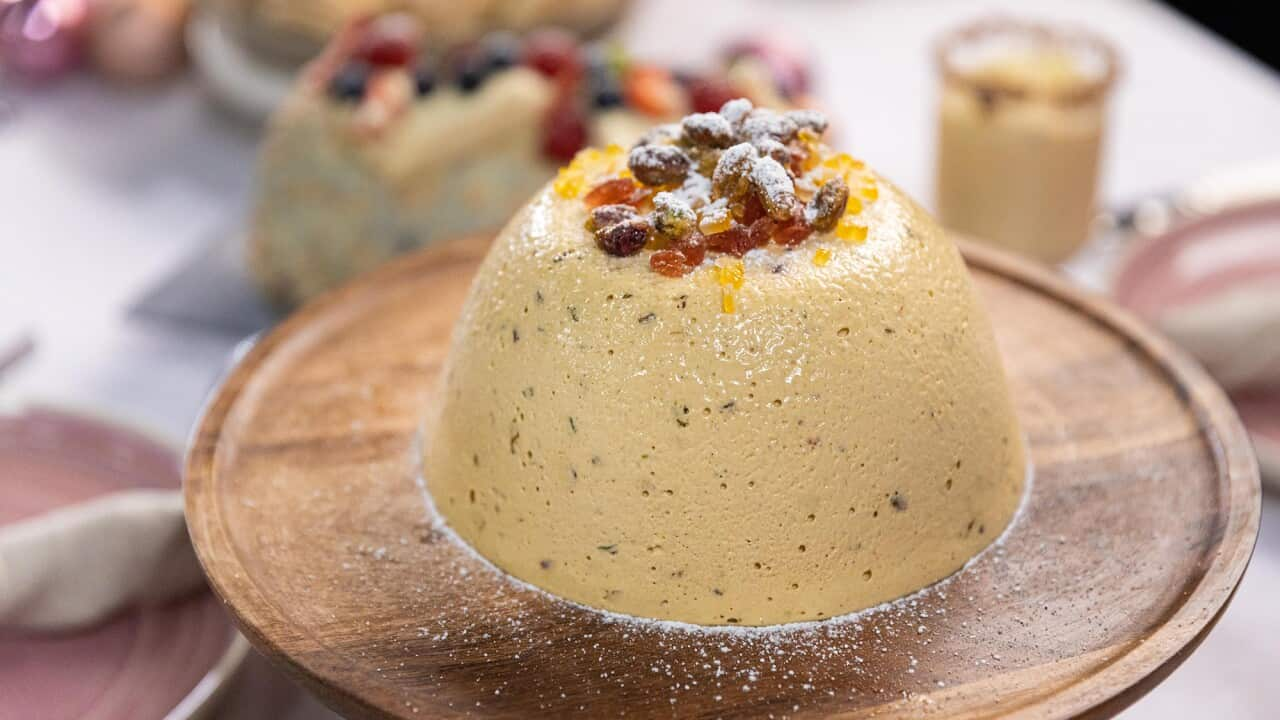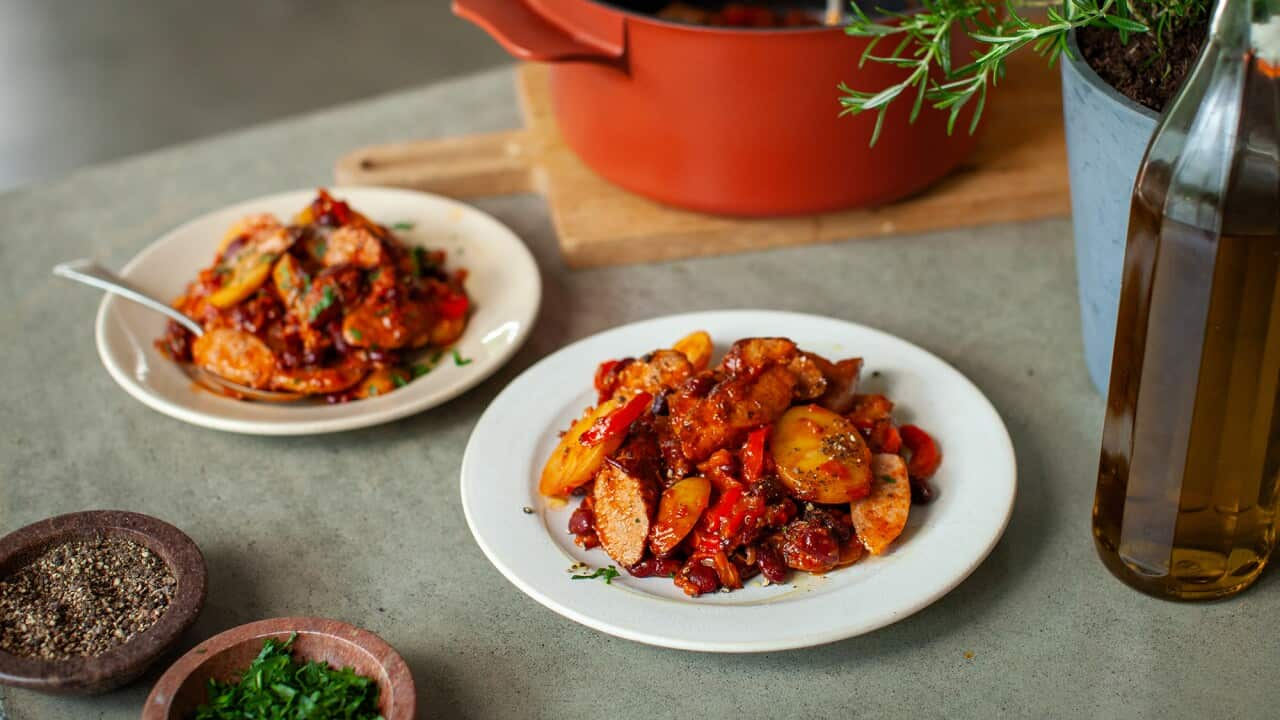makes
40
prep
40 minutes
cook
1 hour
difficulty
Mid
makes
40
serves
preparation
40
minutes
cooking
1
hour
difficulty
Mid
level
The meringue mixture is made using the Swiss meringue method of heating the eggwhites and sugar together over a bain marie until the sugar dissolves and the mixture is hot before whisking. Don’t be tempted to cut the whisking time with this method as the meringue structure won’t be fully formed until it is cooled completely and you will end up with little pools of shapeless meringue on your tray once piped instead of petite ‘kisses’.
This recipe is part of our column. Read tips on how to make the perfect meringue in her column.
Ingredients
Chocolate swirl meringues
- 4 eggwhites
- 220 g (1 cup) caster sugar
- 1 tsp natural vanilla essence or extract
- 1½ tbsp Dutch cocoa powder
Caramel ganache
- 100 g dark (70% cocoa) chocolate, finely chopped
- 55 g (¼ cup) caster sugar
- 2 tbsp water
- 100 ml pure (pouring/thin) cream
- 20 g salted butter, cubed
Cooling time: 1 hour
Standing time: 10 minutes
Equipment: sugar thermometer, piping bag with plain 11 mm nozzle
Instructions
Chocolate swirl meringues
1. Preheat oven to 110°C (non fan-forced). Line a large oven tray with non-stick baking paper.
2. Combine the eggwhites and sugar in the heatproof bowl of an electric stand mixer and place over a saucepan of simmering water (make sure the bowl fits snugly in the saucepan and the base doesn’t touch the water). Stir with a whisk until the sugar is dissolved completely and the mixture reaches 55°C on a sugar thermometer.
3. Transfer the bowl to the stand mixer and whisk with the whisk attachment on medium-high speed for 10 minutes or until very thick and glossy and the mixture has cooled completely to room temperature. Whisk in the vanilla.
4. Transfer the meringue mixture to a large wide bowl. Sift the cocoa powder over the top of the meringue mixture and use a spatula to fold the mixture 2-3 times to roughly swirl the cocoa powder through.
5. Carefully spoon the meringue into a large piping bag fitted with a plain 11 mm nozzle. Holding the piping tip about 1 cm from the lined tray, pipe small ‘kisses’ about 3 cm in diameter and 2 cm apart on the tray.
6. Bake for 1 hour or until the meringue is crisp and hard to touch, but not coloured. Turn off the oven, leave the door slightly ajar and cool the meringues in the oven.
Caramel ganache
7. Meanwhile, place the chocolate in a heatproof bowl. Combine the caster sugar and water in a small saucepan and use a wooden spoon to stir over low heat until the sugar dissolves. Increase the heat to medium and bring to the boil. Boil for about 10 minutes, brushing down the side of the pan with a pastry brush dipped in water to dissolve any sugar crystals, until the mixture turns a deep caramel. Remove immediately from the heat and carefully add the cream and butter. Stir with a wooden spoon until well combined and the caramel is smooth. Pour the warm caramel over the chocolate and set aside for 1 minute. Stir with a metal spoon until smooth. Set aside at room temperature for 1 hour, stirring occasionally, or until cooled and thickened to a spreadable consistency. (Makes about 200 ml.)
8. Spread the base of a cooled meringue with a little of the ganache and then sandwich with another meringue. Repeat with the remaining meringues and ganache. Set aside for at least 10 minutes for the ganache to firm slightly before serving.
Baker’s tips
• The unsandwiched meringues will keep in an airtight container in a cool, dry place for up to 3 days. Once sandwiched with the ganache they are best eaten the same day, but keep them in an airtight container until serving time.
Photography by Alan Benson. Styling by Sarah O'Brien. Food preparation by Tina McLeish. Creative concept by Belinda So.
This recipe is part of our column. Read tips on how to make the perfect meringue in her column.
Cook's Notes
Oven temperatures are for conventional; if using fan-forced (convection), reduce the temperature by 20˚C. | We use Australian tablespoons and cups: 1 teaspoon equals 5 ml; 1 tablespoon equals 20 ml; 1 cup equals 250 ml. | All herbs are fresh (unless specified) and cups are lightly packed. | All vegetables are medium size and peeled, unless specified. | All eggs are 55-60 g, unless specified.
The meringue mixture is made using the Swiss meringue method of heating the eggwhites and sugar together over a bain marie until the sugar dissolves and the mixture is hot before whisking. Don’t be tempted to cut the whisking time with this method as the meringue structure won’t be fully formed until it is cooled completely and you will end up with little pools of shapeless meringue on your tray once piped instead of petite ‘kisses’.
This recipe is part of our column. Read tips on how to make the perfect meringue in her column.









